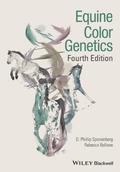Equine Color Genetics

4. Edition August 2017
352 Pages, Hardcover
Practical Approach Book
Equine Color Genetics, Fourth Edition presents a detailed examination of the color variation in horses and donkeys and the genetic mechanisms that produce color variations.
* Thoroughly covers the basic colors in horses, including bay, chestnut, black, and brown
* Details the genetic basis of the colors built from the basic coat color, including dilutions and white patterning
* Provides an explanation of genetic mechanisms that determine coat color
* Presents a thorough revision and update, including new advances in molecular genetics, biochemistry, molecular mechanisms, genetic loci, coat colors before domestication, and more
* Offers a new introduction describing the principles of genetics and genomics research to help outline how knowledge is discovered and to assist the reader in understanding concepts covered in the book
1 Introduction 1
1.1 Basic Horse Color Identification 3
1.2 Basic Principles of Genetics, Genomics, and Molecular Biology 10
1.3 Pigment Cell Function and Genetic Control 18
2 Basic Dark Horse Colors: Bay, Chestnut, Black, and Brown 23
2.1 Bay, Chestnut, and Black 23
2.2 Two Subtypes of Bay: Wild Bay and Bay 32
2.3 Seal Brown 34
2.4 Dominant Black 36
3 Modifications Affecting Most Colors 39
3.1 Shade 39
3.2 Sooty 46
3.3 Mealy 53
3.4 Mane and Tail Color on Chestnut and Sorrel 57
3.5 Bend Or Spots 62
3.6 Dapples 63
3.7 Brindle and Chimeras 63
3.8 Eye Color 68
3.9 Foal Color 71
4 Dilutions of the Basic Dark Colors 75
4.1 Linebacked Dun 76
4.2 Cream-related and Pearl Colors 93
4.3 Champagne 107
4.4 Silver Dapple 114
4.5 Mushroom: Definition, Classification, and Genetic Control 122
4.6 Lavender 123
4.7 Other Dilutions 124
4.8 Compound Dilute Colors 125
5 Overview of the Genetic Control of Horse Color 131
6 Patterns with Individually Distributed White Hairs 137
6.1 General Considerations 137
6.2 Patterns of White with Individually Distributed White Hairs: Grey and
7 Nonsymmetric Patches of White: White Marks, Paints, and Pintos 165
7.1 Face and Leg Markings 166
7.2 Nonsymmetric White Body Patches: Paint or Pinto Patterns 170
8 Patterns with Symmetric White Patches: The Leopard Complex 211
Rebecca Bellone, Sheila Archer, and D. Phillip Sponenberg
8.1 Leopard Complex 211
9 Overview of Patterns Adding White 239
10 Horse Color and Horse Breeding 243
11 Peculiarities of Hair Growth 247
12 Donkey Color 251
12.1 Colors of Donkeys 251
12.2 Patterns of White 261
12.3 Genetics of Donkey Color and Patterns 272
12.4 Summary of Donkey Color and Patterns 277
12.5 Hair Growth in Donkeys 278
13 Summary Tables 279
Bibliography 323
Index 335
D. Phillip Sponenberg, DVM, PhD, is Professor of Pathology and Genetics in the Department of Biomedical Sciences and Pathobiology at the Virginia-Maryland College of Veterinary Medicine in Blacksburg, Virginia, USA.
Rebecca Bellone, PhD, is Associate Adjunct Professor in the Veterinary Genetics Laboratory and Department of Population Health and Reproduction at the University of California-Davis in Davis, California, USA.


